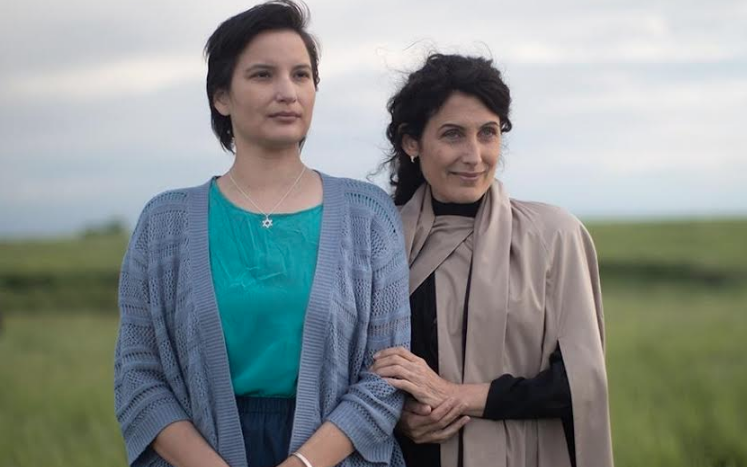
- Details
- By Native News Online Staff
American public broadcaster PBS has announced the premiere of Canadian drama Little Bird, which follows the life of a First Nation woman who was forcefully removed from her family as a child during Canada’s Sixties Scoop.
The six-part, one-hour limited series, created by Canadian First Nations filmmaker Jennifer Podemski and playwright Hannah Moscovitch, stars Darla Contois and Lisa Edelstein and follows the life of Bezhig Little Bird, a victim of the Sixties Scoop in Saskatchewan during which indigenous children were taken from their families and adopted by white families.
Removed from her home in Long Pine Reservation, Bezhig Little Bird is adopted into a Montreal Jewish family at age five. Now in her 20s, Bezhig longs for the family she lost and is willing to sacrifice everything to find them. Her search lands her in the Canadian Prairies. As she begins to track down her siblings, she unravels the mystery behind her adoption and discovers that her apprehension is connected to a racist government policy.
“It is a powerful narrative that not only engages and pulls on your heartstrings but also educates on a profoundly disturbing time in North American history that is rarely portrayed,” Germaine Sweet, Managing Director, Content Acquisitions at PBS Distribution, said in a press release.. “In addition to the creative brilliance of Jennifer Podemski and Hannah Moscovitch, this series was delivered by a wealth of Indigenous talent both in front of and behind the camera.”
The character-driven drama features Indigenous actors, including Ellyn Jade, Osawa Muskwaa, and Joshua Odjick. Rounding out the cast is award-winning actress Lisa Edelstein, playing Esther’s adoptive mother, Golda Rosenblum.
PBS will also broadcast Coming Home, which is a 90-minute companion documentary directed by Erica Daniels, which explores the connections between the movement for Indigenous narrative sovereignty and the impact of the child welfare system.
Little Bird and Coming Home will be available for streaming on October 12, 9:00 E.T., on all station-branded PBS platforms, including PBS.org and the PBS app, and on Apple T.V., Android T.V., Amazon Fire T.V., Samsung Smart T.V., Chromecast, and VIZIO.
More Stories Like This
A Native American Heritage Month Playlist You Can Listen to All Year Long11 Native Actors You Should Know
Five Native American Films You Should Watch This Thanksgiving Weekend
Heavy metal is healing teens on the Blackfeet Nation
Over 150 Tribal Museums Participate in Fourth Annual Celebration of Native Life
Help us tell the stories that could save Native languages and food traditions
At a critical moment for Indian Country, Native News Online is embarking on our most ambitious reporting project yet: "Cultivating Culture," a three-year investigation into two forces shaping Native community survival—food sovereignty and language revitalization.
The devastating impact of COVID-19 accelerated the loss of Native elders and with them, irreplaceable cultural knowledge. Yet across tribal communities, innovative leaders are fighting back, reclaiming traditional food systems and breathing new life into Native languages. These aren't just cultural preservation efforts—they're powerful pathways to community health, healing, and resilience.
Our dedicated reporting team will spend three years documenting these stories through on-the-ground reporting in 18 tribal communities, producing over 200 in-depth stories, 18 podcast episodes, and multimedia content that amplifies Indigenous voices. We'll show policymakers, funders, and allies how cultural restoration directly impacts physical and mental wellness while celebrating successful models of sovereignty and self-determination.
This isn't corporate media parachuting into Indian Country for a quick story. This is sustained, relationship-based journalism by Native reporters who understand these communities. It's "Warrior Journalism"—fearless reporting that serves the 5.5 million readers who depend on us for news that mainstream media often ignores.
We need your help right now. While we've secured partial funding, we're still $450,000 short of our three-year budget. Our immediate goal is $25,000 this month to keep this critical work moving forward—funding reporter salaries, travel to remote communities, photography, and the deep reporting these stories deserve.
Every dollar directly supports Indigenous journalists telling Indigenous stories. Whether it's $5 or $50, your contribution ensures these vital narratives of resilience, innovation, and hope don't disappear into silence.
 The stakes couldn't be higher. Native languages are being lost at an alarming rate. Food insecurity plagues many tribal communities. But solutions are emerging, and these stories need to be told.
The stakes couldn't be higher. Native languages are being lost at an alarming rate. Food insecurity plagues many tribal communities. But solutions are emerging, and these stories need to be told.
Support independent Native journalism. Fund the stories that matter.
Levi Rickert (Potawatomi), Editor & Publisher

